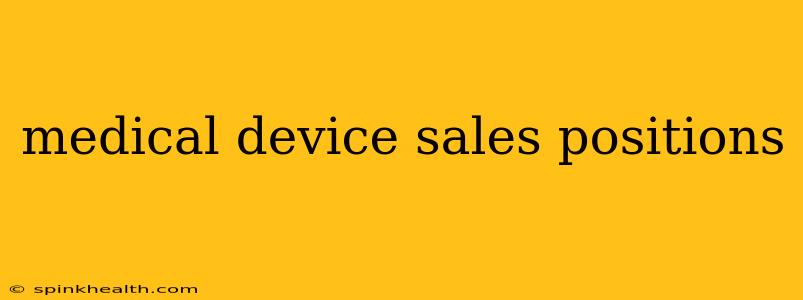Cracking the Code: A Journey into the World of Medical Device Sales
The world of medical device sales isn't just about selling; it's about forging relationships, understanding complex technologies, and ultimately, improving patient lives. It's a challenging yet incredibly rewarding career path, demanding a unique blend of scientific knowledge, sales acumen, and unwavering dedication. My journey into this field started with a simple question: How can I combine my passion for science with my drive to succeed in business? The answer? Medical device sales.
This isn't your average sales job. It requires a deep understanding of the medical field, the intricacies of specific devices, and the regulatory landscape governing their use. You're not just selling a product; you're selling a solution to a problem, often one with significant implications for a patient's health and well-being.
Let's dive into the specifics, addressing some common questions surrounding medical device sales positions:
What are the typical responsibilities of a medical device sales representative?
This isn't a 9-to-5 job. A typical day might involve:
- Building relationships: This is the cornerstone of success. You'll spend considerable time networking with surgeons, physicians, hospital administrators, and other healthcare professionals. Building trust and rapport is paramount.
- Product demonstrations: You'll be showcasing the devices you represent, highlighting their features and benefits in a clear, concise, and engaging manner. This requires a deep understanding of the product’s functionality and its clinical applications.
- Handling objections: Doctors and administrators are discerning buyers. You'll need to address their concerns and objections effectively, providing compelling evidence of the product's value proposition.
- Sales cycle management: This includes everything from lead generation to closing the deal and ensuring customer satisfaction post-sale. This requires meticulous organization and follow-up.
- Regulatory compliance: Staying up-to-date with the latest regulations and guidelines is crucial. Non-compliance can have serious consequences.
- Continuing education: The medical field is constantly evolving. Staying current on the latest medical advancements and technological developments is essential for staying competitive.
What kind of education or experience is needed for medical device sales?
While a degree in a science-related field (biology, engineering, etc.) is highly advantageous, it’s not always mandatory. However, a strong understanding of medical terminology and physiology is essential. Relevant experience in healthcare, sales, or a combination of both is often preferred. Proven success in a sales-oriented role, demonstrating strong communication and interpersonal skills, can significantly boost your candidacy.
What is the typical salary for a medical device sales representative?
Compensation in medical device sales is generally competitive, often including a base salary plus commission. The exact amount can vary widely depending on factors like experience, location, company size, and the specific device being sold. High earners often benefit from strong relationships, exceeding quotas, and demonstrating a commitment to long-term customer success.
What are the career advancement opportunities in medical device sales?
The career trajectory in this field offers various growth opportunities. You could move into regional sales management, national sales management, or even into marketing or product development roles within the company. The skills you develop—relationship building, negotiation, strategic planning—are highly transferable to other sectors.
What are the challenges of working in medical device sales?
The challenges are real:
- High-pressure environment: Meeting sales targets can be demanding, especially in a competitive market.
- Extensive travel: Expect significant travel, often to multiple hospitals and clinics across a large geographical area.
- Complex regulatory environment: Navigating FDA regulations and other compliance requirements can be intricate and time-consuming.
- Rejection: Not every sales pitch will result in a sale. Developing resilience and a positive attitude is crucial.
The journey into medical device sales is not without its hurdles, but the potential rewards—both professionally and personally—are immense. For those with a passion for science, a drive to succeed, and a commitment to improving patient lives, this career path offers a uniquely fulfilling and rewarding experience. It's a career where every sale is a victory, not just for the company, but for the patients whose lives are touched by the innovative technology you represent.

